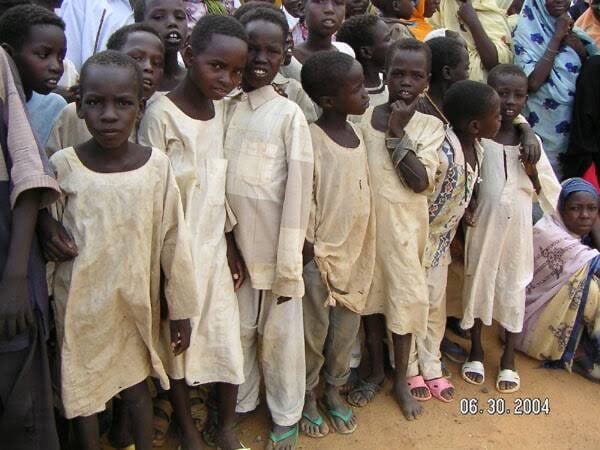In yet another tragedy of Sudan’s ongoing war, it was announced on August 25 that an entire family perished in the Abu Shouk displacement camp near El Fasher in North Darfur.
The family – two grandmothers, three children, and their mother – died after consuming food and drink made from livestock feed locally known as ambaz, amid crushing living conditions and an acute shortage of food, according to the Sudanese newspaper Al-Taghyeer.
The neighbour who discovered the incident said she alerted the emergency room, but rescuers could not arrive in time.
Abu Shouk camp is one of the oldest and largest displacement camps in Darfur, established in 2004 on the outskirts of El Fasher to absorb mass waves of displacement caused by violence at the time. Today it hosts tens of thousands of civilians suffering from hunger, disease, and the absence of the most basic necessities of life. The camp lies about five kilometers north of El Fasher.
A Camp of Tragedies:
Abu Shouk is surrounded by misery on all sides, symbolizing Sudan’s enduring suffering since the war erupted in mid-April 2023 between the army and the Rapid Support Forces (RSF).
On August 10, 2025, Abu Shouk’s emergency room in El Fasher, North Darfur, reported the deaths of 60 people due to hunger and malnutrition, amid a dramatic deterioration of living conditions and an almost total collapse of food supplies.
Mohamed Adam, the camp’s media officer, stated at the time that the number of deaths had risen alarmingly to more than 60, including children and the elderly, compared to a rate of four deaths per week the previous month. He noted that the price of a sack of flour had soared to more than 11 million Sudanese pounds – about 3,700 U.S. dollars – making access to food nearly impossible.
He added that children, women, and the elderly were suffering from horrific hunger and emaciation, while malnutrition had become a commonplace reality. Health services had come to a halt after medical centers closed.
In May 2025, Darfur 24 reported on a severe food crisis in Abu Shouk that forced children to eat dirt to ease their hunger.
Om Al-Nas, a mother living in the camp, recounted seeing two little girls eating soil on her way to the market. She said she was forced to take shelter in a relative’s house due to artillery shelling, where she saw the children in a state of extreme hunger.
She explained that the girls’ mother had left early in the morning to obtain ambaz from an oil mill – animal fodder used by displaced families as a food substitute – but was delayed in returning, leaving the children to consume dirt.
Meanwhile, the Sudanese army and allied militias have been preventing civilians from leaving El Fasher and its displacement camps, imposing a blockade on the city to stop them from reaching safe zones designated by the RSF.
Suffering Across the Land:
The ordeal is not confined to the children of Abu Shouk. Now in its third year, the war has plunged millions of Sudanese children into a hell of death, displacement, and hunger.
On August 21, 2025, the Horn of Africa Women’s Network (Sihah) said it had documented cases in Sudan of kidnapped infants, sexual violence across all ages – including the elderly – and exclusion of victims.
Adila Abu Bakr, the network’s coordinator for protection, response, and documentation, said during a regional online seminar on conflict-related sexual violence that “violations were committed by the joint armed movements force and the al-Baraa ibn Malik Brigade.” She acknowledged the challenges facing the network’s work, including underfunded protection efforts, social stigma, the collapse of hospital infrastructure, and the absence of service providers.
Recruitment:
Amid rising child abductions in Sudan, the Sudanese Human Rights Observatory documented that the Port Sudan government has been recruiting children and sending them to battlefields.
This coincided with Sudanese Education Minister Tihami al-Zain’s announcement that students participating in military operations would be exempt from school fees, an act rights advocates described as an official admission of child involvement in combat.
On August 21, 2025, the Observatory published a video of an injured child after a battle, stating the footage “documents the crime of exploiting children and forcing them into combat operations by the Sudanese Armed Forces.”
It stressed that the use of children in armed conflict constitutes a flagrant violation of international humanitarian law and the Convention on the Rights of the Child, depriving them of their natural right to life, childhood, and safety.
Sudanese activist Ahmed Batieh, in an article, argued that forcing families to send their sons – even minors – into battlefields is a full-fledged crime. He wrote: “To throw children into a war without dignity, a war with no project but the destruction of what remains of this homeland, exposes a complete failure – military, political, and moral. Compelling every family to deliver one member to the fire is the clearest proof that the army and the Islamist movement lack the competence to train and mobilize qualified fighters. When they fail to form a professional force, they resort to stealing childhood innocence and turning it into fuel for their wars.”
He added: “What happened in the Kordofan operations – Abqoud is a glaring example – demonstrates the brutality of this approach: children of tender age dragged into battlefields instead of schools and playgrounds, finding themselves in arenas of death they cannot even comprehend. What future awaits a nation that drains its childhood in this way?”
Batieh concluded: “Forced recruitment of children is not only a stain on the Islamist movement and its supporters, but a crime punishable under international law – a curse that will haunt its perpetrators, no matter how long it takes.”
Legal expert Noon Kshkosh affirmed that “using children in hostilities or recruiting them constitutes one of the war crimes” and violates international humanitarian law and its civilian protection protocols.
Researcher Abla Boush, who studies mental health and social impacts, said child recruitment “represents an uprooting from the world of childhood. Where there should be play, education, and emotional safety, children are thrust into violence, death, and coercion.” This radical shift, she explained, leaves devastating psychological scars.
She noted that the most common outcome is post-traumatic stress disorder, where children suffer “intrusive memories that replay scenes of war as though happening in the present, terrifying nightmares, hypervigilance leading to constant tension, and emotional numbness – the loss of the ability to feel joy or sadness.”
She added that the experience may inflict what she called “moral injury”: when a child is forced to commit violent acts, creating an inner conflict between their values and the actions they had to take to survive. As a result, they may feel “profound guilt, shame, and a distorted self-image,” sometimes leading to “a detachment from the self, as though it was not them who committed those acts.”





